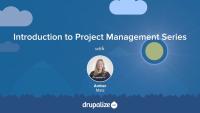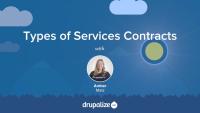This series introduces you to the concepts and tools of website development project management. You will learn from active project managers at Lullabot, who share their real-world experience with large clients and projects. This series focuses on general project management but also points out places where Drupal helps or hinders that process.
Welcome to a special series on Project Management from Drupalize.Me. This series differs from our usual format of screencasts and presentations. We interviewed Lullabot's technical project managers, the Chief Operating Officer, and the Account Director, and organized the footage into a series of lessons on topics that project managers (PMs) deal with on a regular basis, including contracts, communication, estimation, tools and methodologies.
Here's what we'll be covering in this Introduction to Project Management series:
- Project Management Methodologies: Learn about terminology and methodologies used in the world of software project management and how combining methodologies from different traditions can work effectively on service projects.
- Tools for Managing Projects: Learn about the kinds of tools that are used in software project management for tracking progress, reporting, and team and client communication.
- Traits of a Project Manager: What makes a great project manager? What characteristics, skills, and approaches are great to have in someone in the role technical project manager?
- Types of Services Contracts: Learn about the different types of services contracts; in particular, the three that Lullabot uses in their client engagements. As you will see, the type of contract can have different implications in a project manager's needed skills and approach.
- Estimation on Drupal Projects: Learn about the challenges of estimation, and insights into the what estimates should communicate and how they should illuminate the various degrees of risk and uncertainty in a project.
- Resourcing and Scheduling: Learn about the challenge of determining how many people are needed for a project, and what questions to ask when determining capacity.
- Putting Together Teams: Learn strategies for how to put together teams, especially for large projects.
- Being Human on Projects: Learn about the people skills that are important to have, ways to detect burnout, and how to help team members get back on track.
- Client Communication: Learn about the many facets of client communication.
- Managing Expectations: Learn strategies for aligning and managing client expectations from the perspective of sales and account management.
- Project Kick-Off Essentials: Learn about the essential elements of a successful project kick-off meeting.
- Problems, Risks, and Red Flags: Learn strategies for identifying and dealing with problems, risks, and red flags on a project.
- Quality Assurance (QA): Learn about the various kinds of QA that you can implement in your project.
- Demos and Retrospectives: Learn about demos and retrospectives, some things to consider in a prototyping process, and what you can learn from these activities.
- Launch and Celebration: Learn some tips for ensuring a successful launch and the importance of celebrating the accomplishments of the team.
Whether you are a developer-turned-project-manager or a seasoned veteran, we think you will find insight into the art and science of project management in this series.
In this lesson, you’ll learn about methodologies and techniques that are often used in project management. These methodologies provide a set of processes for a development team to utilize, and a framework that a project manager can use to structure a project’s tasks and progress. You’ll hear from project managers at Lullabot who explain terms such as Waterfall, Agile, Wagile or Consultancy Scrum, Kanban, Scrum, and Sprints and how a tailored combination of these techniques often leads to the best results.
Additional resources
In this lesson, we’ll hear from Lullabot project managers about what they think makes a good ticket tracking system, some helpful ways to organize tickets, and other features including tracking conversations, email notifications, and reporting features that many ticket software platforms can provide. We’ll also hear about a tool called a Gantt chart which can help a project manager answer questions such as “when the project will be finished”, “what the critical path is”, and “what are the dependencies in this project?”
Additional resources
- Gantt Charts (SmartSheet)
- Burn down chart
- zenhub.io for GitHub
- Agile for JIRA
- Trello.com (standalone w/some integrations)
- JIRA: Agile plugin has a nice tool for planning sprints
- GitHub: use Milestones
In this lesson, you’ll hear from Lullabot’s Chief of Operations, Account Director, and several technical project managers about what they think makes a good project manager. These traits of a good PM include: being a great communicator, having the ability to distill a project into tasks, taking initiative to clear blockers for developers, probing stakeholders for requirements, assumptions, and other vital information, demonstrating leadership, and finally being able to have difficult conversations with clients—discussing uncomfortable truths with tact and diplomacy. Are you on the path to becoming a project manager? Or maybe you’re looking to improve your skills? With these insights, learn about the variety of technical and people skills that make for a great project manager.
Additional resources
Want to dive deeper? Here are some books recommended by project managers at Lullabot:
- Peopleware: Productive Projects and Teams by Tom DeMarco & Timothy Lister
- Making Things Happen: Mastering Project Management by Scott Berkun
- Tribal Leadership: Leveraging Natural Groups to Build a Thriving Organization by Dave Logan, John King & Halee Fischer-Wright
- User Stories Applied: for Agile Software Development by Mike Cohn
- Analysis without Paralysis: 12 Tools to Make Better Strategic Decisions by Babette E Bensoussan & Craig S Fleisher
- Software Estimation by Steve McConnell
- The Mythical Man-Month: Essays on Software Engineering by Frederick P. Brooks, Jr.
In this lesson, you’ll learn about three types of services contracts: the fixed bid or fixed scope, time and materials, and a retainer-based contract. You’ll also hear about the Iron Triangle: budget, scope, and timeline, and how these elements are controlled or can flex in these different types of agreements. Finally, you’ll learn about how a contract can imply a certain level of trust and how building successful relationships with clients can lead to future, more mutually favorable agreements.
Additional resources
In this lesson, you’ll learn what makes a good estimate and what some good questions are to ask in the estimation process. You’ll also hear about how an estimation process can detect unclear requirements and what kind of communication needs to happen as a result of that discovery. Finally you’ll learn some helpful techniques for estimation that provide just the right amount of detail.
Additional resources
Want to dive deeper? Here are some books recommended by project managers at Lullabot:
Books
- Peopleware: Productive Projects and Teams by Tom DeMarco & Timothy Lister
- Making Things Happen: Mastering Project Management by Scott Berkun
- Tribal Leadership: Leveraging Natural Groups to Build a Thriving Organization by Dave Logan, John King & Halee Fischer-Wright
- User Stories Applied: for Agile Software Development by Mike Cohn
- Analysis without Paralysis: 12 Tools to Make Better Strategic Decisions by Babette E Bensoussan & Craig S Fleisher
- Software Estimation by Steve McConnell
- The Mythical Man-Month: Essays on Software Engineering by Frederick P. Brooks, Jr.
Online Resources
- Systems development life cycle
- Scrum Breakfast (blog)
- Agile Software Development .com
- Certifications in Scrum
- Software Effort Estimation Considered Harmful
and on the opposite spectrum: How to Estimate
Templates
Articles by Lullabots
- Building a Development Matrix by Jerad Bitner
- The Art of Estimation by Seth Brown
- An Update on the Art of Estimation by Jerad Bitner
Methods
In this lesson, you’ll learn about the challenge of determining how many people are needed for a project, what questions to ask when determining capacity, and finally signals that may indicate that it’s time to bring others in or remove team members from a project.
Additional resources
The Mythical Man-Month: Essays on Software Engineering by Frederick P. Brooks, Jr.
In this lesson, you’ll learn some strategies for how to put together teams, especially for large projects. You’ll hear about the advantages of organizing a project into work streams, what that means, and how it can be advantageous to break up a large project team into smaller, more efficient groups.
In this lesson, you’ll learn about the human side of project managing; what people skills are important to have, and ways to detect burnout and help team members get back on track.
In this lesson, you will hear a variety of perspectives on the many facets of client communication. As trust directly impacts communication, you will hear about how trust varies depending on the type of project. In difficult conversations, learn about the importance of listening. To build trust and manage tricky situations, learn about transparent, proactive communication of risk factors. On a practical level, you’ll learn about the importance of translating client discussions into action items for the development team, and how the ticket queue can be a great place to capture important discussions and facilitate client communication with the project team.
In this lesson, you will learn some strategies for aligning and managing client expectations from the perspective of sales and account management. Learn how you, as a project manager, can work with an account manager to effectively communicate with a client to find out whether or not expectations are being met.
In this lesson, you’ll learn about the essential elements of a successful project kick-off meeting or on-site, including who should be there and what should be done during this time.
In this lesson, you’ll learn strategies for identifying and dealing with problems, risks, and red flags on a project. You’ll also learn tips for being a proactive and diplomatic communicator, ensuring that progress and velocity is up to speed, and the importance of minding the boundaries of your relationship with the client and how to effectively advocate for the project, without forgetting the people who can ultimately make the project successful.
Additional resources
In this lesson you will learn about different approaches to Quality Assurance (QA), the importance of doing QA throughout the project, and how QA can be used as a basis for documentation and help for the client.
Additional resources
Testing the front end with CasperJS
Automate Your Life with Phing
CSS Regression Testing with Resemble.js
Write A Hello World Test for Drupal 7 with SimpleTest
Automated Testing in Drupal 7 with SimpleTest
Quality Assurance with Selenium
Careful with that Debug Syntax
In this lesson, you’ll learn about demoing your progress to the client and the team, along with some things to consider in a prototyping process. We'll also talk about retrospectives, when the team takes time to review not just the work produced but the process behind it as well.
In this lesson, you’ll learn some tips for ensuring a successful launch and the importance of celebrating the accomplishments of the team.















